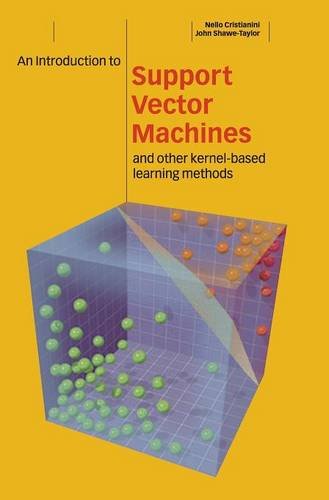An Introduction to Support Vector Machines and Other Kernel-based Learning Methods pdf download
Par brown lily le lundi, novembre 9 2015, 21:18 - Lien permanent
An Introduction to Support Vector Machines and Other Kernel-based Learning Methods by John Shawe-Taylor, Nello Cristianini


Download eBook
An Introduction to Support Vector Machines and Other Kernel-based Learning Methods John Shawe-Taylor, Nello Cristianini ebook
ISBN: 0521780195, 9780521780193
Page: 189
Format: chm
Publisher: Cambridge University Press
Introduction The support vector machine (SVM) proposed by Vapnik [1] is a powerful methodology for solving a wide variety of problems in nonlinear classification, function estima- tion, and density estimation, which has also led to many other recent developments in kernel-based methods [2–4]. In this review, we describe the basic concepts and algorithms behind machine learning-based genetic feature selection approaches, their potential benefits and limitations in genome-wide setting, and how physical or genetic interaction networks Introduction. Shawe-Taylor, An introduction to sup- port vector machines and other kernel-based learning methods (Cambridge: Cambridge University Press, 2000). Most disease phenotypes are genetically complex, with contributions from combinations of genetic variation in different loci. It includes two phases: Training phase: Learn a model from training data; Predicting phase: Use the model to predict the unknown or future outcome . A Support Vector Machine provides a binary classification mechanism based on finding a hyperplane between a set of samples with +ve and -ve outputs. Support Vector Machines (SVMs) are a technique for supervised machine learning. The subsequent predictive models are trained with support vector machines introducing the variables sequentially from a ranked list based on the variable importance. It has been shown to produce lower prediction error compared to classifiers based on other methods like artificial neural networks, especially when large numbers of features are considered for sample description. More formally, a support vector machine constructs a hyperplane or set of hyperplanes in a high- or infinite-dimensional space, which can be used for classification, regression, or other tasks. Predictive Analytics is about predicting future outcome based on analyzing data collected previously. An Introduction to Support Vector Machines and Other Kernel-based Learning Methods. Their reproducibility was evaluated by an internal cross-validation method. This is because the only time the maximum margin hyperplane will change is if a new instance is introduced into the training set that is a support vectors. "Boosting" is another approach in Ensemble Method.
The consumer society: myths and structures ebook download